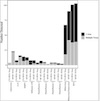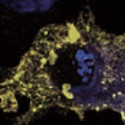 Viral Detection by Reverse Transcriptase Polymerase Chain Reaction in Upper Respiratory Tract and Metagenomic RNA Sequencing in Lower Respiratory Tract in Critically Ill Children With Suspected Lower Respiratory Tract Infection Society of Pediatric Critical Care Medicine, 2024
|
 Validation of a murine proteome-wide phage display library for identification of autoantibody specificities JCI Insight, 2023
|
 Implementation of California COVIDNet - a multi-sector collaboration for statewide SARS-CoV-2 genomic surveillance Frontiers in Public Health, 2023
|
 The antibiotic resistance reservoir of the lung microbiome expands with age in a population of critically ill patients Nature Journal, 2023
|
 Challenges and advances in the medical treatment of granulomatous amebic encephalitis Sage Journals, 2024
|
 ZSCAN1 autoantibodies are associated with pediatric paraneoplastic ROHHAD Annals of Neurology, 2022
|
 Autoantibodies to Perilipin-1 Define a Subset of Acquired Generalized Lipodystrophy Diabetes, Jan 2023
|
|  The Premonition: A Pandemic Story The Premonition: A Pandemic Story, by Michael Lewis, is a new book that describes the efforts of scientists and public health officials before and during the 2020 coronavirus pandemic. Readers may be interested in reading the original papers from the DeRisi Lab that are described in the book. PDFs of the original papers, ordered by mention in the book, are detailed below. This includes supporting information and links to online lectures by Dr. DeRisi. Additional resources are at the
Chapter 6: The Original Papers and Supporting Information
Papers from the first SARS, 2003
Snake Arenavirus - Discovery and Characterization
The Red Phone: Metagenomics for Infectious Disease Discovery in Humans
A platform for global monitoring of infectious disease: IDseq
Chapter 10: The COVID-19 Pandemic
|
 Scientists at Chan Zuckerberg (CZ) Biohub, Mayo Clinic and University of California, San Francisco (UCSF), have discovered an autoimmune disease that appears to affect men with testicular cancer. A postdoctoral fellow in the DeRisi lab, Caleigh Mandel-Brehm, led the study together with a clinical fellow at the Mayo Clinic, Divyanshu Dubey. Using a combination of customized programmable phage display, immunohistochemical staining, and other techniques, antibodies to the protein Kelch-like Protein 11 (KLHL11) was identified as a highly specific marker of a new paraneoplastic autoimmune syndrome associated with seminoma in men. Click Here for the Full Press Release |
|